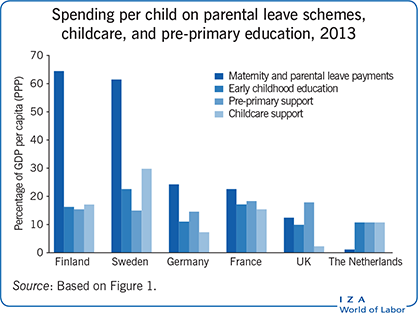Elevator pitch
Most OECD countries spend substantially more on maternity leave schemes than on early childcare. However, given high tax burdens and rapidly aging populations, female labor force participation is critically needed. Moreover, it is important to know whether the main beneficiaries, the children themselves, reap more benefits from one or the other in the long term. The first cohorts exposed to the introduction or extension of maternity/paternity leave schemes and subsidized childcare programs have now completed education and entered the labor market, allowing an investigation of these programs’ long-term economic effects.

Key findings
Pros
Expansions of universal formal childcare generate positive long-term effects on child outcomes.
Effects seem to be strongest for cognitive outcomes, in particular language skills.
Children from low socio-economic backgrounds seem to benefit most, while those from high socio-economic backgrounds do not gain as much but are not hurt either.
High-quality childcare, which brings together children from diverse backgrounds at an early age, enhances intergenerational mobility.
Cons
Extensions of maternity leave beyond the first few months generate few positive long-term effects on child outcomes, especially when the alternative care quality is high.
Not all childcare expansions are successful; they need to be of high quality and have widespread societal support.
Children’s non-cognitive outcomes suffer when childcare is of poor quality or if weekly hours spent in care are high.
Not all children benefit equally from childcare, and varying effects have been found by gender and family income.